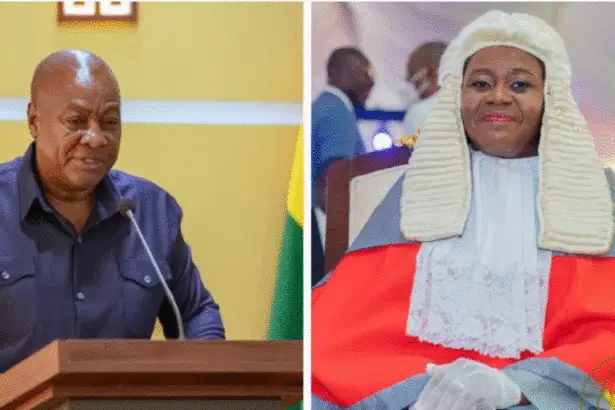Petition for Chief Justice’s removal: Mahama’s comment in 2022 complicates matters – IMANI
IMANI Africa said in its “Criticality Analysis of Governance Issues | March 23 – 29, 2025” that such evidence not only casts doubt over the impartiality of the removal process but also suggests that these latest petitions may have underlying political motivations.
- Advertisement -
IMANI Africa has said in relation to the petitions seeking the removal of the Chief Justice Gertrude Torkornoo that a video evidence of President John Dramani from an NDC lawyers’ conference in 2022 when he was presidential candidate, alluding to the potential change in judicial leadership to instil trust in the judiciary, complicates matters relating to the petitions seeking the removal of the current Chief Justice.
At that event, it is recalled that Mr Mahama said “Unfortunately, we have no hope that the current leadership of our judiciary can lead such a process of change. We can only hope that a new Chief Justice will lead the process to repair the broken image that our judiciary has acquired over the last few years.”
- Advertisement -
IMANI Africa said in its “Criticality Analysis of Governance Issues | March 23 – 29, 2025” that such evidence not only casts doubt over the impartiality of the removal process but also suggests that these latest petitions may have underlying political motivations.
- Advertisement -
“The appearance of this footage has led many observers to label the petitions as preposterous and malicious, indicating that the initiative might be driven by a strategic recalibration of political narratives rather than by a bona fide concern for judicial misconduct,” IMANI Africa said.
It added “The unfolding petition process against Ghana’s Chief Justice encapsulates a complex interplay between constitutional mandates, the evidentiary standards of a prima facie case, and emerging political influences. As the dispute continues, it becomes imperative for all stakeholders to commit firmly to transparency and due process. Only a rigorously fair procedure—anchored in the rule of law—can safeguard both judicial independence and the public’s enduring trust in Ghana’s democratic institutions.”
The policy think tank further observed that the renewed controversy surrounding the petition process to remove Ghana’s Chief Justice has once again thrust constitutional principles and judicial independence into the national debate. Under the 1992 Constitution—specifically Article 146—the removal of a Chief Justice can only proceed once a correct procedural path has been followed. Central to this process is the establishment of a prima facie case, a Latin term meaning “at first glance,” which requires that the evidence presented be sufficient to justify a deeper inquiry into allegations of misconduct or incompetence. Legal experts emphasize that while natural justice mandates the right to be heard, a preliminary prima facie determination does not necessarily require the immediate ex parte hearing of the accused if subsequent due process provisions can be ensured.
- Advertisement -
The spate of petitions—now the third attempt in recent years—raises critical concerns. Repeated efforts to initiate the removal process suggest that what might appear prima facie may well be intertwined with political agendas aimed at undermining judicial independence rather than a genuine pursuit of accountability. Previous petitions, as documented by several news reports, were dismissed after failing to meet the evidentiary threshold, yet the recurrence of these actions casts a lingering shadow over the integrity of the process. Critics warn that when removal petitions are continuously repeated, they risk eroding public confidence in the impartiality of Ghana’s judiciary, potentially transforming a legally prescribed procedure into a tool for politically motivated interventions.
In response to the emerging allegations, Chief Justice Gertrude Torkornoo’s decision to formally request copies of the petitions submitted against her is nonetheless both a constitutional right and a procedural safeguard.
By insisting on the documentation of allegations prior to any further consultations with the Council of State, she upholds the common law principle of audi alteram partem— the right to be heard—which is embedded in both our legal tradition and the 1992 Constitution.
“This measured course of action enables her to prepare an appropriate response, ensuring that any subsequent inquiry is grounded in a comprehensive review of evidentiary material rather than in hearsay or selective allegations. She attests to have predicated same principle in matters of similar nature regarding other Justices of the Supreme Court in her request to the President,” IMANI said.
IMNAI recommends that “The safeguards and transparency mechanisms inherent in the constitutional process must be strengthened by mandating that all submissions and evidentiary materials related to removal petitions of the Chief Justice be made available for to the accused person, thus minimizing the risk of partisan manipulation and reinforcing judicial accountability.
“This approach should include a statutory reform or a constitutional interpretation of establishing a prima facie in the removal of the Chief Justice whereby the petitioner must provide concrete evidence supporting their claims, while the Chief Justice is afforded sufficient time and resources to engage in a comprehensive adversarial process, including public hearings and the submission of detailed written responses.”
Source: 3news.com
- Advertisement -




